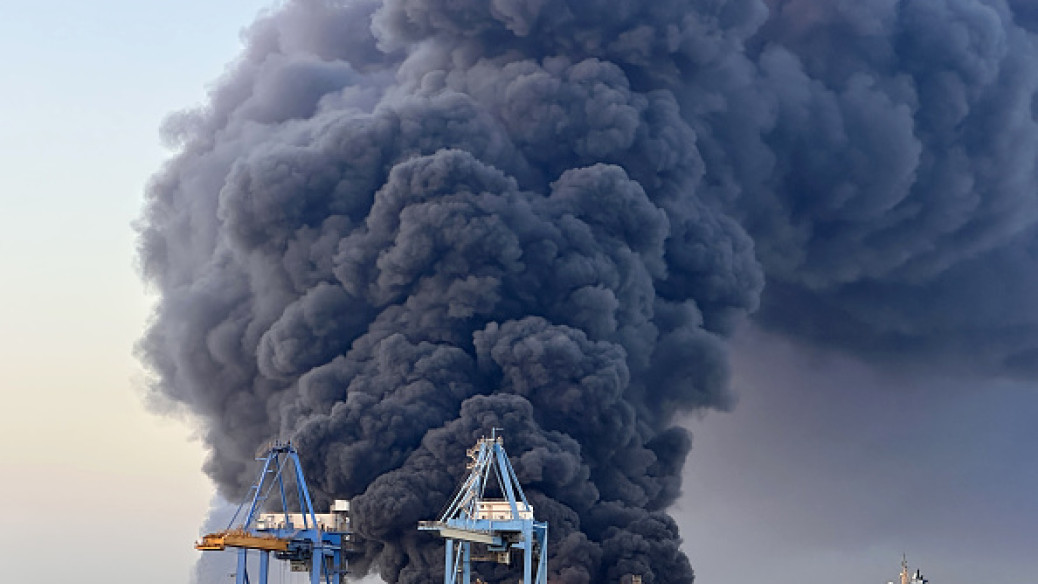The Flamingo naval base, where Sudan’s army has set up a temporary headquarters, is under heavy attack by the RSF militia
The Sudanese army’s main naval base, Flamingo, has become the latest target of the Rapid Support Forces (RSF) militia, amid the ongoing civil war in the country.
On Thursday, the RSF launched several drone strikes on the base, located in Port Sudan, which is currently acting as the temporary headquarters of the military due to the intensity of fighting in Khartoum, The New Arab’s sister site Al-Araby Al-Jadeed reported.
Thursday marked the RSF’s fifth consecutive day attacking the Flamingo naval base.
The army’s spokesman, Nabil Abdullah, told Reuters that anti-aircraft missiles successfully intercepted drones attempting to attack the base, shooting down most of them.
The RSF’s drone strikes, ongoing since Sunday, have caused fires at oil sites and a power station in the base’s vicinity.
Drones also targeted the Osman Digna Air Base warehouse as well as other civilian facilities in the city. An ammunition depot at the Osman Digna base was among the other sites hit, causing several explosions.
What is known about the base?
The Flamingo naval base was established in the early 1960s under the rule of former President Ibrahim Abboud, who was also the army’s commander-in-chief and the first military leader to rule Sudan after it gained independence in 1956.
Its logo is inspired by the flamingo, a bird found on the coast of Port Sudan, as well as other parts of Africa. The base includes naval docks, an army camp and officers’ quarters. It has been modernised several times, most notably in the 1970s with the assistance of the former Yugoslavia, which enjoyed good relations with Sudan during that period.
The base has been of utmost importance to the Sudanese military due to its strategic location in the Red Sea region. The army uses the base to monitor its vast Red Sea coastline and to oversee international maritime traffic.
Russian interest
The naval base was thrust into the spotlight after Russia and ousted ex-President Omar al-Bashir signed an agreement in 2017 allowing Moscow to establish a military base close to Flamingo, to be used for the next 25 years.
After al-Bashir’s overthrow in 2019, the deal was frozen. However, in late 2020, Moscow unilaterally published a copy of the agreement to establish the base in an attempt to pressure Sudan to implement it.
Russia’s interest in the base can be interpreted as a way to counter other foreign influences in the region, notably the US, the UK, and the EU, amid its attempt to solidify its influence in the continent.
The base was also the site of Russian-American tensions in 2021, after ships from the US and Russian navies arrived at Port Sudan.
The Sudanese naval authorities allocated a berth for the US destroyer USS Winston Churchill, away from the Russian frigate Admiral Grigorovich, which had arrived days earlier and began unloading its equipment to establish a military base.
Sudanese authorities then dismantled the new Russian facility and withdrew its equipment in late April 2021, which was then followed by the suspension of its agreement with Moscow regarding the base, pending legislative approval.
Used to deliver messages during war
In August 2023, the Flamingo base was also used by Sudanese army leader Abdel-Fattah al-Burhan to deliver messages during the war. It marked the military chief’s first time addressing the conflict.
Major General Moatasem Abdel Qader, an advisor at the Higher Academy for Strategic and Security Studies, told Al-Araby Al-Jadeed that the RSF’s attack on the base “comes just as they previously attempted to seize the army’s General Command and the Armored Corps in Khartoum,” and “are now attempting to sabotage the army’s bases after failing to seize them”.
The Sudanese army, led by Burhan, and the RSF paramilitaries, headed by Mohamed Hamdan Daglo, have at war since April 2023, when a power struggle between the two military leaders degenerated into open warfare.
At least 150,000 civilians have been killed by the conflict, with the true figure believed to be much higher. Over 15 million Sudanese are currently displaced due to the war.
NGOs have decried the humanitarian crisis in the east African country, where families, including children and babies, are faced with severe food and medicine shortages.
Rights groups have also condemned the numerous war crimes and rights abuses carried out by the RSF against civilians during the war. Scores of Sudanese women have come forward with cases of sexual violence and rape at the hands of Daglo’s paramilitaries.

